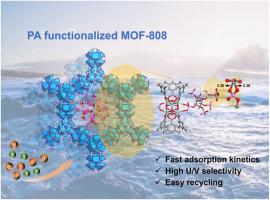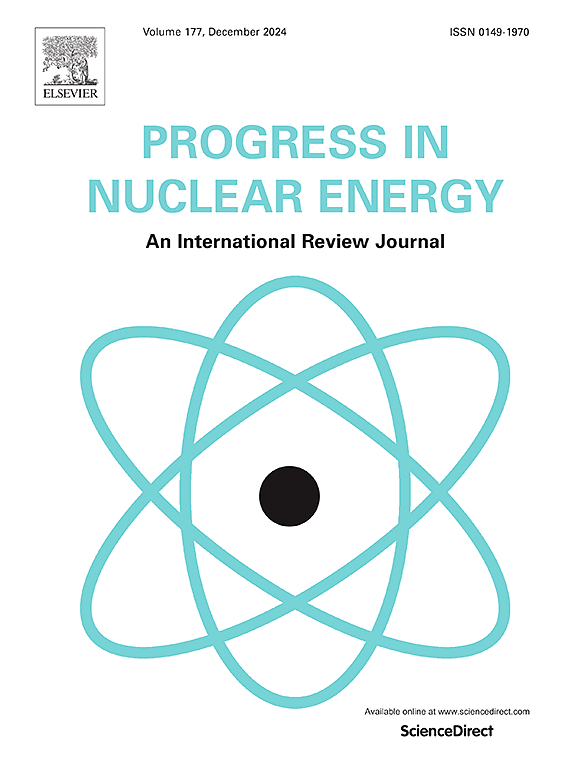Phytic acid functionalized MOF-808 for seawater uranium extraction with high capacity and selectivity
IF 3.2
3区 工程技术
Q1 NUCLEAR SCIENCE & TECHNOLOGY
引用次数: 0
Abstract
The efficient extraction of uranium from seawater plays an important role to guarantee a sustainable nuclear energy industry. Zr-based metal-organic frameworks (MOFs) are promising uranium adsorbents due to their high stability, customizable functionality and adjustable topological structure. In this study, Zr based MOF-808 with tunable phytic acid (PA) functionalization (MOF-808-PA1 and MOF-808-PA2) were prepared. The modulation of PA modification significantly promoted the uranium extraction of MOF-808 with the saturated adsorption capacity reaching 423.89 mg/g and adsorption equilibrium achieved in 15 min in aqueous solution. Impressively, MOF-808-PA2 exhibited superior selectivity towards uranium with the distribution coefficient up to 9.2 × 105 mL/g, which overwhelms other competitive ions in simulated seawater. After adsorption in real seawater for 28 days, uranium capture capacity of MOF-808-PA2 reached 7.85 mg/g, 8 times higher than that of vanadium. DFT simulation indicated that the excellent seawater uranium extraction performance originated from the strong affinity between abundant P-O/P=O and uranyl ions. This work highlights the design of high-performance uranium adsorbents based on functional group modification in MOFs system.

植酸功能化MOF-808高容量、高选择性海水提铀
从海水中高效提取铀对保证核能工业的可持续发展起着重要作用。zr基金属有机骨架(mof)具有高稳定性、可定制功能和可调节的拓扑结构,是一种很有前途的铀吸附剂。本研究制备了植酸可调功能化的Zr基MOF-808 (MOF-808- pa1和MOF-808- pa2)。PA改性显著促进了MOF-808的铀萃取,饱和吸附容量达到423.89 mg/g,在水溶液中吸附15 min达到平衡。令人印象深刻的是,MOF-808-PA2对铀表现出优异的选择性,其分布系数高达9.2 × 105 mL/g,在模拟海水中压倒了其他竞争离子。在真实海水中吸附28天后,MOF-808-PA2的铀捕获能力达到7.85 mg/g,是钒的8倍。DFT模拟结果表明,海水提铀的优异性能源于丰富的P-O/P=O与铀酰离子之间的强亲和力。本文重点研究了基于官能团修饰的mof体系中高性能铀吸附剂的设计。
本文章由计算机程序翻译,如有差异,请以英文原文为准。
求助全文
约1分钟内获得全文
求助全文
来源期刊

Progress in Nuclear Energy
工程技术-核科学技术
CiteScore
5.30
自引率
14.80%
发文量
331
审稿时长
3.5 months
期刊介绍:
Progress in Nuclear Energy is an international review journal covering all aspects of nuclear science and engineering. In keeping with the maturity of nuclear power, articles on safety, siting and environmental problems are encouraged, as are those associated with economics and fuel management. However, basic physics and engineering will remain an important aspect of the editorial policy. Articles published are either of a review nature or present new material in more depth. They are aimed at researchers and technically-oriented managers working in the nuclear energy field.
Please note the following:
1) PNE seeks high quality research papers which are medium to long in length. Short research papers should be submitted to the journal Annals in Nuclear Energy.
2) PNE reserves the right to reject papers which are based solely on routine application of computer codes used to produce reactor designs or explain existing reactor phenomena. Such papers, although worthy, are best left as laboratory reports whereas Progress in Nuclear Energy seeks papers of originality, which are archival in nature, in the fields of mathematical and experimental nuclear technology, including fission, fusion (blanket physics, radiation damage), safety, materials aspects, economics, etc.
3) Review papers, which may occasionally be invited, are particularly sought by the journal in these fields.
 求助内容:
求助内容: 应助结果提醒方式:
应助结果提醒方式:


